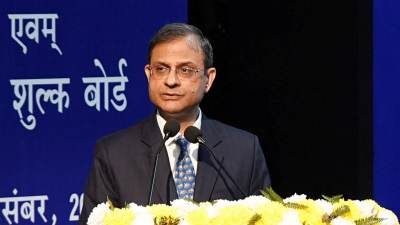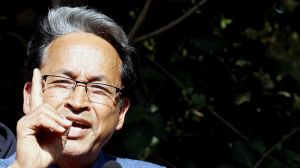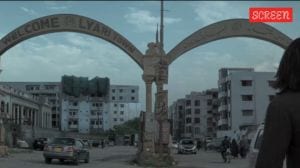Click here to follow Screen Digital on YouTube and stay updated with the latest from the world of cinema.
Tigmanshu Dhulia recalls when he would ‘roam in the jungles’ with Irrfan, decodes late actor’s ‘unpredictable’ performances
Journalist-author Shubhra Gupta's upcoming book 'Irrfan: Life in Movies', published by Pan Macmillan India, traces the late star's journey.
 Irrfan Khan (left) and Tigmanshu Dhulia worked together in Paan Singh Tomar and Haasil. (Photo: Express Archives)
Irrfan Khan (left) and Tigmanshu Dhulia worked together in Paan Singh Tomar and Haasil. (Photo: Express Archives) Irrfan Khan passed away at the age of 53 in April 2020, and the actor’s fans, friends and family members are still mourning his loss. Journalist-author Shubhra Gupta’s upcoming book ‘Irrfan: Life in Movies’, published by Pan Macmillan India, traces the late star’s journey, and features many of his collaborators including Tigmanshu Dhulia, Mira Nair, Vishal Bhardwaj, Anurag Basu, and also his wife Sutapa Sikdar.
Here is an exclusive excerpt from the upcoming book, in which Dhulia speaks about their collaboration in the National Award-winning film Paan Singh Tomar, their work together in Dhulia’s first film Haasil, Irrfan’s acting process, and his last days.
Excerpt from ‘Irrfan: Life in Movies’:
 Irrfan Khan in a still from Paan Singh Tomar.
Irrfan Khan in a still from Paan Singh Tomar.
SG : Out of the films that you’ve done with him, which is your favourite?
TD: I think if I consider Irrfan – only Irrfan, and not anyone else’s contribution so much – I would say his best performance is Paan Singh Tomar, undoubtedly. But my favourite film is Haasil, because Haasil was much more than a film. Haasil made me, made Irrfan. Haasil was also not releasing for a year; we were just showing everyone the film, in the hope that someone would buy it. Vishal Bhardwaj had seen Haasil, and then cast Irrfan in Maqbool. Irrfan got Maqbool because of Haasil.
SG: In the film industry, I’m told, everyone’s so busy with their lives and their career that nobody finds the time for friendship. But you and Irrfan did manage to spend time together?
TD: Yes, a lot. Only, I don’t know why … because of being a little busy, the frequency of our hangouts decreased. He had to do a lot of foreign trips, so we couldn’t meet much. But yes, we used to meet a lot before that. We used to go out, roam in the jungles. We had our kids around the same time. Our wives got pregnant around the same time, and all our kids were born within a gap of a month or two. First Babil, then my daughter. Our kids even grew up together. Tenth, twelfth tak toh the kids even studied together.
 Irrfan with filmmaker Togmanshu Dhulia. (Photo: Express Archives)
Irrfan with filmmaker Togmanshu Dhulia. (Photo: Express Archives)
SG: One thing that I’ve been struggling to put into words is: how is it possible to live in a world without Irrfan? In his passing, I have not seen this kind of overwhelming grief that so many people across the board expressed. It was like one of their own had passed. How does it feel to be without an artist of his calibre? You, of course, are a dear friend and you saw him through the really bad days towards the end.
TD: See, it’s a very difficult question, so I’ll start with his method. Irrfan’s method when he was working was also how he lived his life. He was a good actor because his observation of life was very surgical, very meticulous. That is why you will not be able to predict what he will do next. Why? Because he is portraying a life. Irrfan’s observation of life was so nice that his performance always used to look fresh, unpredictable; he used to rise above his character.
What is acting? Consciously you have to portray an unconscious behaviour. Because you are an actor, you are doing it with skill, you are conscious. But you have to portray that it’s unconscious; I can check my phone and also tie my shoelaces at the same time. This behaviour can only be portrayed well if you have understood life, na? Most actors in India, who have never stepped outside Bombay, what have they seen of life? That’s why, over the past ten years, you are able to see good actors because they are coming from smaller towns.
It’s not that we don’t have good actors, but somebody like Irrfan used to push me. See, I’m a writer as well. Every picture that I have worked on, I have written myself. The work starts there, with writing, because I’m not working on somebody else’s material. I’m working on something I created myself. And if I have Irrfan in mind, I know that Irrfan will fit this character. Without Irrfan telling me, there’s a push from behind, to write it well. And come up with a difficult character because you’re giving it to Irrfan. You’re not giving it to some normal, ordinary actor, who’ll do a competent job, and if the performance gets lost we’ll fix it with the background score. No, you’re writing it for Irrfan. Now Irrfan never really pestered me to write like this. But your responsibility as an artist increases, in a healthy way. You’re writing material for a great actor. He rises above the script. Since then I’ve worked with many new actors, the kind of actors that the world is fond of. But they’re not at that level.
 Irrfan Khan and Jimmy Sheirgill in Haasil. (Photo: Express Archives)
Irrfan Khan and Jimmy Sheirgill in Haasil. (Photo: Express Archives)
SG: What did he think about your performances? Did you ever chat about that?
TD: Gangs of Wasseypur* was my first performance. I remember I hadn’t seen it. I said, ‘What will I do by watching it?’ Irrfan went and watched it. Our offices were next to each other’s, so he came to my office and said, ‘Yaar, you’ve done great acting in it.’ I remember when he was producing the film Madaari – this is my regret – Sutapa and Irrfan had both come and offered me Jimmy Sheirgill’s role. I don’t know, for some reason – I didn’t have the time or something – but I said I wouldn’t do it. I don’t remember if Irrfan and Jimmy had a scene together in the film. Us sharing the screen … it couldn’t happen.
SG: Sutapa told me that even towards the end he was reading some brilliant scripts and how he was struggling with his pain but was always so positive. You were in touch with him during those days. That must have been so tough.
TD: I mean, I remember Irrfan every day. That said, if you want me to say it in a more profound and poetic way, as a good friend and an artist, I’ll try and push myself. Irrfan was a good human being as well. I’ll tell you one incident – you must write about this. We were about to start shooting for Saheb Biwi Aur Gangster Returns, so we went to the same location where part one was shot. [During] During part one, we had a very bad experience with some beehives. It was an old, dilapidated haveli, and there were these huge beehives. And the cook there placed the tandoor right below a beehive during lunchtime. When the smoke rose, the entire unit of bees flew out. They stung a lot of people, including me.
 Irrfan with wife Sutapa Sikdar. (Photo: Sutapa Sikdar/Facebook)
Irrfan with wife Sutapa Sikdar. (Photo: Sutapa Sikdar/Facebook)
When we started doing part two, there were more beehives, and this time they were inside the haveli also. So I said, ‘Yaar, remove this beehive. It’s too dangerous. Irrfan and other actors were staying in the haveli, because there weren’t any hotels. Next morning when I went to Irrfan’s room, he was very angry. He said, ‘Tishu, what have you done, yaar? I saw they had burnt the beehive; all the bees were lying dead. Thousands of bees were dead.’ He was so upset. I said, ‘I didn’t ask them to burn it; I asked them to move it. I’m not an expert on the method of removing.’ What bees do for the environment … Irrfan got so disturbed thinking about that. He had this quality; he was very close to nature. That’s why all this reflects in his performance. Now these new actors that come, they want to become Irrfan. Irrfan did not want to become Naseer [Naseeruddin Shah]. He came to make his own destiny.
- 01
- 02
- 03
- 04
- 05


































